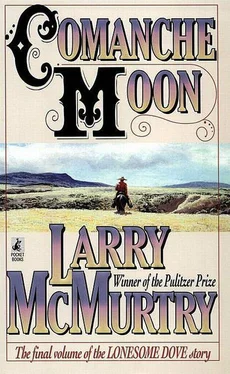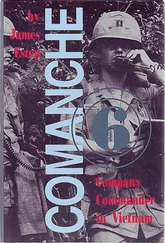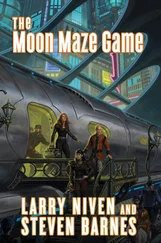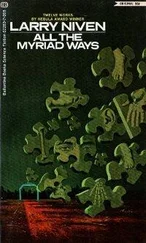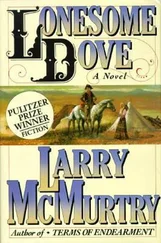"How far ahead do you suppose Captain Call's party is?" the Major asked the next morning, as he was sipping coffee.
"I can't really say, Major," Augustus said. "We're the slow wing of this procession." "We've come quite a distance from that fort, sir," the Major said. "Why do you think we're slow?" "Because we still stop and sleep at night," Augustus said. "Sleep does slow a troop down, unless you sleep in your saddle, and Mr.
Goodnight is the only one of us who's skilled at saddle snoozing. Call don't sleep at night, neither does Goodnight, and neither does Famous Shoes. I imagine some of the men with them are so tired they'd be willing to get scalped if only they could have a good nap afws." Major Featherstonhaugh seemed unconvinced by the remark--or, if not unconvinced, uninterested.
"It's time to give out the prunes now," he said. "We mustn't forget the prunes, Captain." Major Hiram Featherstonhaugh was a firm believer in the efficacy of prunes, as an aid to regularity for men on the march. One of the pack mules carried two large sacks of prunes; leaving nothing to chance, the Major had Deets open one of the sacks each morning, so that he himself could dispense the prunes. He personally handed each man in the company six prunes, which, after some experimentation, he had concluded was the number of prunes most likely to ensure clear movements in a troop of men on the march.
"Here now, have your prunes, gentlemen," the Major said, as he went briskly around the troop. "Clear movements now, clear movements." Augustus, the last man to receive his morning allotment, waited until the Major's back was turned and dropped his back in the sack. He did not insist that the rangers eat prunes, but he urged them not to throw them away, either.
"We might get to a place out here on the baldies where a prune would taste mighty good," he said. "Just wait till the Major ain't looking and put them back in the sack." Pea Eye particularly hated prunes; he had carelessly eaten one the first morning and had been unable to rid himself of the pruny taste all day.
"What kind of a tree would grow a prune?" he asked.
"A Vermont kind of tree, I reckon," Augustus said. "The Major says he grew up eating them." "Maybe that's why he don't never smile," Pea Eye said. "They probably shrunk up his mouth till he can't get a smile out." "Or it might be that he's got nothing to smile about, particularly," Augustus said. "Here he is in Texas, which he don't like, trying to count Indians he can't find and couldn't whip if he did find." Within an hour of breaking camp the rangers found themselves riding into a brisk north wind. The long horizons quickly blurred until there was no horizon, just blowing yellowish dust. The rangers tied their bandannas over their noses and their mouths, but the soldiers lacked bandannas and took the stinging dust full in the face. The wind that whirled across the long spaces sang in their ears, unnerving some of the soldiers, recent arrivals who had never experienced a full norther on the plains. The howling wind convinced some of the young recruits that they were surrounded by wolves or other beasts.
The rangers had told them many stories of Comanche torture, but had said nothing about winds that sounded like the howling of beasts.
"On a day like this it's good that the Major don't smile," Pea Eye said to Jake.
"If he did it would just let in the grit." In the afternoon the wind, which had been high to begin with, increased to gale force. Increasingly, it was difficult to get the horses to face it; also, the temperature was dropping. Augustus tried to persuade Major Featherstonhaugh of the wisdom of stopping until the norther blew itself out.
"It won't blow like this long, Major," he said. "We could take shelter in one of these gullies and wait it out. Out here it's risky to travel when you can't see where you're going. We might ride off a cliff." Major Featherstonhaugh was unmoved by the advice. Once started, he preferred not to stop until a day's march had been completed, however adverse the weather conditions.
"I don't need to see where I'm going, Captain," he said. "I have a compass. I consult it frequently. I can assure you that we're going north, due north." An hour later the half-blinded troop stumbled into and out of a steep gully; in the rock terrain, half peppered by blowing sand, the Major dropped his compass, but didn't immediately register the loss. When, at the half hour, he reached for it, meaning to take his bearings, as he always did twice hourly, he discovered that he no longer had his compass, a circumstance which vexed him greatly.
"I must ask you to stop the troop and wait, Captain," he said. "I must have dropped my compass when we were crossing that declivity--what do you call it?" "A gully, Major," Gus said.
"Yes, that's probably where it is," the Major said. "It's back in that gully. I'll just hurry back and find it." "Major, I doubt you'll find it," Augustus said. "The sand's blowing so thick you can barely see your horse's ears. That compass will be covered up by now, most likely." "Nonsense, I'm sure I can find it," the Major said. "I'll just retrace my steps.
You give the men a few prunes, while you're waiting. Important to avoid constipation, Captain--an army can't fight if it's constipated." "Major, I've got a compass, take it," Augustus said, horrified by what the man planned to do. He was convinced that if the Major rode off in such a storm they would probably never see him again.
"I know mine probably ain't as good as yours, but it will point you north, at least," he assured the Major, holding out his own compass.
"I don't want your compass, Captain--I want my own," Major Featherstonhaugh said firmly. "It was my father's compass--it was made in Reading, England--x's our family compass.
It's made the trip around the Cape. I'm not going to leave it in some declivity in west Texas. I'd never be able to face Pa. He expects me to have this compass when I come home, I can assure you of that, Captain McCrae.
Prunes, men, prunes." With that, the Major turned and was gone.
Augustus was nonplussed. He knew he ought to send someone with the Major, to help him find his way back, but he had no one to send except himself and he did not feel it wise to leave the troop, in such a situation. The men were huddled around him--in the blowing sand they seemed spectral, like gray ghosts. His rangers, veterans of many severe northers, were stoical, but the army boys were nervous, stunned by the abrupt departure of their commander.
"I guess I should have roped him, but it's too late now," Augustus observed. The sandstorm had promptly swallowed up the Major.
"Now he's rode off and left me in command," Lieutenant Dikuss said, appalled at being thrust into a position of responsibility under such conditions, at such a time and in such a place.
Augustus smiled. He could not help being amused by the large lieutenant from Wisconsin.
At that moment Lieutenant Dikuss was staring hopelessly at the wall of sand into which his commanding officer had just disappeared.
"It must have been a mighty good compass," Jake Spoon said. "It would have to be made of emeralds for me to go looking for it in a wind like this." "I doubt you'd know an emerald if you swallowed one, Jake," Augustus said, dismounting. "That compass was made in Reading, England, and besides, the Major's got his pa to think about." "I don't know what to do, Captain," Lieutenant Dikuss admitted, looking at his gray, cold, gritty men.
"Well, one thing we can do is let the prunes be," Augustus said. "Myself, I'd vote for a cup of coffee over a goddamned prune."
The sandstorm raged until sunset; the whirling sand seemed to magnify the sun as it sank--fora time the sand and dust even made it seem that the sun had paused in its descent. It seemed to hang just above the horizon, a great malign orb, orange at the edges but almost bluish in the center.
Читать дальше
